
06/28/2012

In less than two hours on Wednesday, an Amarillo jury found a Middle Eastern man guilty of trying to build a weapon of mass destruction. Saudi national Khalid Aldawsari (pictured) came to the United States as a student to study chemical engineering at Texas Tech, but his interests turned to jihad instead of science.
He was arrested in February 2011 after his attempt to purchase explosive chemicals was reported to the authorities. He wasn’t on any agency’s watchlist for dangerous guys who contact questionable imams in Yemen and elsewhere, making him a DIY guy of the sort police worry over.
In 2005, President Bush decided it would be a good idea to welcome thousands of Saudi students to American universities. In 2008, the number was increased. Bush’s pal King Abdullah paid for generous scholarships for the many thousands of his countrymen, and Aldawsari was one of 10,000 lucky Saudis who received a grant and visa in 2008.
A cynical person might reflect we have been lucky that none of them has killed an American yet, though not for lack of trying. One example: the whacked-out airplane disruptor, Yazeed Mohammed Abunayyan, tried to run people down with his car in Ashland several days before he terrified airplane passengers with what seemed a terror attack.
The Kingdom announced last December that a record number of Saudis were studying in the United States: nearly 50,000, also noting that “as recently as 2005, only 2,500 Saudi students were studying in the U.S.”
Tuition-hungry universities love well-heeled foreign students with their fat checkbooks, but aren’t 50,000 Saudi students excessive from a national security viewpoint??
Saudi man found guilty in Texas bomb plot trial, Associated Press, June 27, 2012
AMARILLO, Texas (AP) — In the months before his arrest, authorities said, Khalid Ali-M Aldawsari collected bomb-making supplies and instructional videos and made a list of targets, from nuclear power plants to the home of a former president. His goal, they said, was to carry out jihad.
Despite his attorney’s protestations that he was a harmless “failure,” Aldawsari was convicted Wednesday of attempting to use a weapon of mass destruction. He faces up to life in prison and is scheduled to be sentenced Oct. 9.
Aldawsari, a 22-year-old former Texas Tech University student, closed his eyes as the verdict was read. It took the jury fewer than two hours to convict him.
Aldawsari was arrested in February 2011 after federal agents secretly searched his West Texas apartment and found bomb-making chemicals, wiring, a hazmat suit and clocks. He also researched possible targets: nuclear power plants, the homes of three former soldiers that were stationed at Abu Ghraib prison and the Dallas home of former President George W. Bush.
Videos found in his apartment showed how to prepare TNP, a chemical explosive. FBI bomb experts have said the amounts in this case would have yielded almost 15 pounds of explosive — about the same amount used per bomb in the 2005 London subway attacks. He also tried to order phenol, a chemical that can be used to make explosives.
Aldawsari’s attorneys acknowledged that he had intent, but argued he never came close to attacking anyone.
Defense attorney Dan Cogdell said during opening arguments last week Aldawsari never took the “substantial step” needed to convict him.
“He’s a failure academically,” Cogdell said. “He’s a failure at relationships.”
Cogdell offered no evidence or testimony on Aldawsari’s behalf. Meanwhile, prosecutors presented three days of witnesses.
On Feb. 1, 2011, Carolina Biological Supply of Burlington, N.C., a chemical company, reported a suspicious $435 order of phenol to the FBI. Separately, shipping company Con-way Freight notified Lubbock police and the FBI the same day with similar suspicions because it appeared the order wasn’t intended for commercial use.
Prosecutors played recordings of a frustrated Aldawsari complaining to the supply company when his order was held up. He had allegedly told the company he wanted the phenol for research to develop a cleaning solution.
“They keep asking me why I’m using this product,” Aldawsari was heard on one tape.
Authorities said Aldawsari purchased bottles of sulfuric and nitric acids — chemicals that can be combined with phenol to create TNP — and kept the recipe for the explosive in several emails and journal entries.
“It just didn’t happen overnight, on impulse,” federal prosecutor Jeffrey Haag said during closing arguments Wednesday morning. “This is something Mr. Aldawsari has been planning for a very, very, very long time.”
Cogdell accused prosecutors of playing “Fear Factor” with the emotions of jurors. He said authorities had substituted facts with prejudice.
“Let’s scare them,” he said in court Wednesday. “Let’s tell them about what could have happened.”
Aldawsari came legally to the United States from Riyadh, Saudi Arabia, to study chemical engineering at Texas Tech. He transferred in early 2011 to nearby South Plains College, where he was studying business. A Saudi industrial company was paying his tuition and living expenses in the United States.
His intentions all along, according to prosecutors, were to plot an attack.
“His focus was on jihad and he was marching down that road,” said Denise Williams, another prosecutor. “He’s been marching since he was 11 years old.”
Cogdell, meanwhile, called Aldawsari “the antithesis of what you’d expect him to be.”
“He’s as grateful and decent and appropriate from an attorney’s standpoint,” he said after the verdict.
This is a content archive of VDARE.com, which Letitia James forced off of the Internet using lawfare.